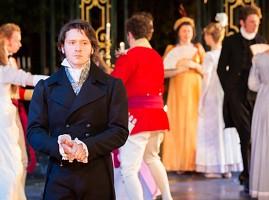Pride and Prejudice - Review
First published in 1813, Jane Austen's famous novel 'Pride and Prejudice' seems as popular as ever - featuring in the list of 'most loved' books, apparently. Given its enduring popularity, it is hardly a surprise that this adaptation by Simon Reade has been included in this year's programme at the Open Air Theatre.
Like the book, the play is set in the England of the Regency era, a period strictly defined as between the years 1811 and 1820, and that would just fit with the publication date of the book. The time period is of considerable importance here because of the formality of the age, and the status of women in the social structure.
Mr and Mrs Bennet have five daughters, a fact which, given the incidence of infant mortality at the time as well as the numerous ailments likely to cause death even in adulthood, is particularly remarkable. The Bennet parents need to find eligible husbands for their daughters. For 'eligible' read 'wealthy'. Marrying for love didn't mean much in Regency society, at least to parents, though it seems to have more appeal and allure for the Bennet offspring. All but one of the daughters seem pretty enough to attract potential marriage partners at least according to the fussing Mrs Bennet, though poor Mary is described by her mother as being merely 'accomplished'. Poor thing.
Balls and dancing figure quite prominently in the story, and these afford opportunities for young men and women to meet and, of course, court. But there is not much courting on the agenda when the prejudiced Elizabeth Bennet meets the proud Mr Darcy. She takes an instant dislike to him for reasons which I found rather unclear. Still, David Oakes's handsome Darcy does appear aloof and somewhat arrogant, even if he is immensely rich. Of course, as the play progresses, we come to understand more about Mr Darcy and his motivations, as does Elizabeth, which forces her to examine her prejudice.
Drifting between various grand homes, the action here isn't easily and economically condensed in terms of theatrical design. But Max Jones has come up with a more than suitable offering which neatly does the trick. A revolving stage is employed to switch between interior and exterior locations, and a large iron fence provides formality as well as the impression of wealth as embodied in elegant country estates.
Discussing the play with her friends at the end of the interval, a woman sitting behind me described it as 'twee' and I think I know what she was getting at. There is a kind of affected elegance here which doesn't fit easily with our modern, more clinical view of society. But I didn't find the formality, or the contrivances in the storyline too much of a problem. I found more to worry about in the humour which seemed to sit a little uneasily with the story. In particular, I thought the portrayal of the obsequious Mr Collins - the heir to the Bennet estate - just too extreme and outlandish, bordering at times on freakishness. The audience seemed to pick up on that too, laughing in a way which suggested incredulity rather than an appreciation of the humour in the character's flaws. Of course, the character is a difficult one to describe. But I think this is a case where a more subtle and controlled approach would have been more powerful and possibly more comedic, and applied more widely would have benefitted other aspects of the production too.
Last year, I got a drenching on both my visits to the Open Air Theatre. On this occasion the elements were kinder, but just after 10pm the rain started, and at 10-15 the play was halted. I headed-off at that juncture as the prospects of a continuance seemed poor and I was already uncomfortably damp. That, I'm afraid, is the nature of open air theatre - magically joyous in good weather, miserable when inclement.
"Lazy and underpowered production...A romp that somehow misses almost everything that makes Pride and Prejudice such a great and wonderfully enjoyable novel. "
Charles Spencer for The Daily Telegraph
"Nuances may be lost, but Deborah Bruce's production deftly brings Austen's characters to life."
Sarah Hemming for The Financial Times
"Deborah Bruce's production has such charm and elegance."
Fiona Mountford for The Evening Standard
"Simon Reade has done a thoughtful, intelligent job and the production looks good, yet what one misses is the persistent, ironic voice of Jane Austen herself."
Michael Billington for The Guardian
Originally published on
